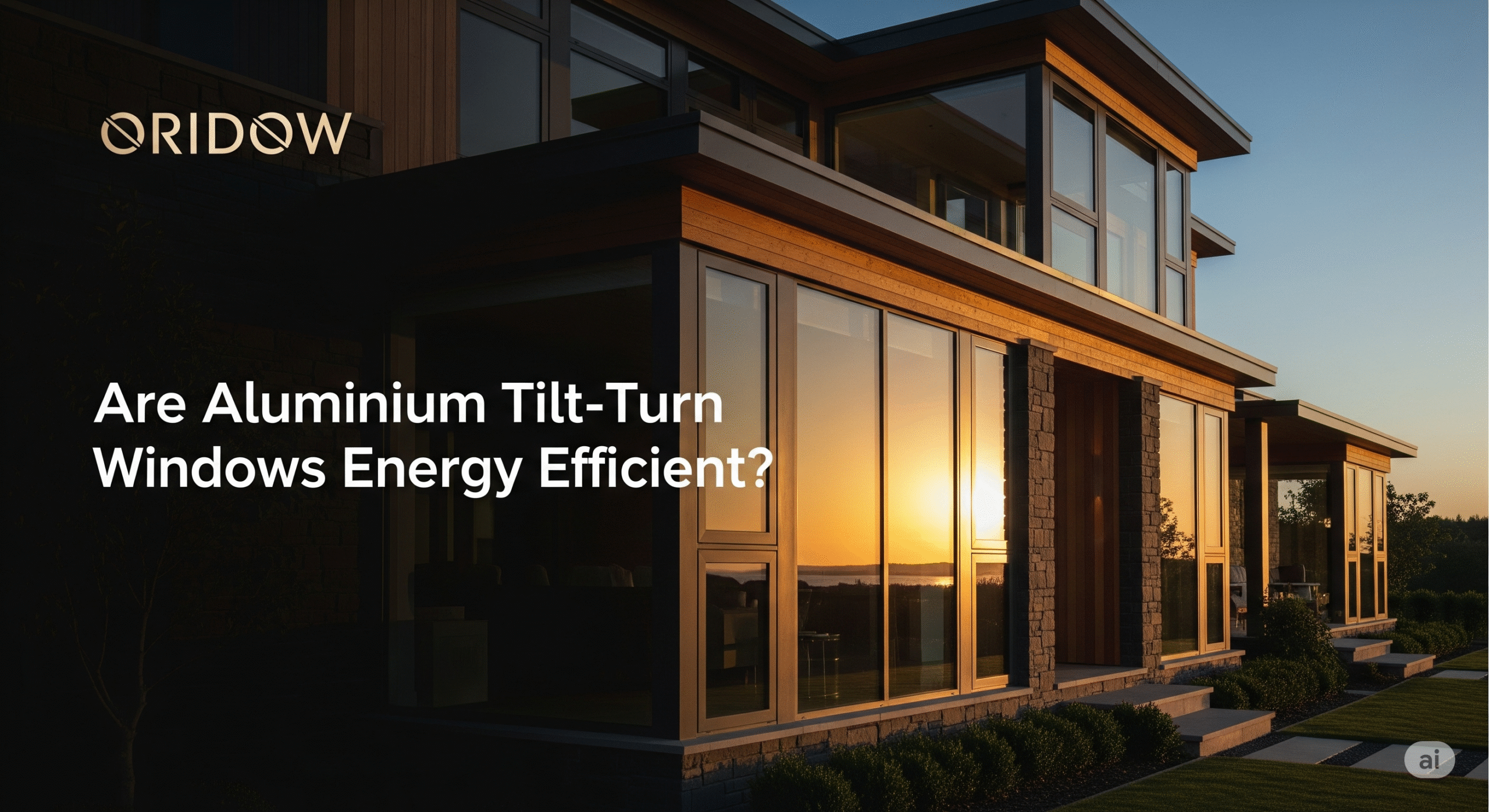Aluminium Tilt-Turn Windows: A Smart Choice for Efficiency
Aluminium tilt-turn windows can be very energy efficient.
Homeowners care about energy bills. They want a comfortable house. They also want to save money. Your windows play a big part. They can either keep your home warm or let heat escape. Many people think aluminium windows are not efficient. They think aluminium lets heat pass through. This was true a long time ago. But modern aluminium windows are different. They use new technology. This technology makes them very efficient. We will look at what makes them so good. We will explain how they save you money. You will learn about key features. These features help keep your home cosy.
Key Takeaways
- Thermal Breaks: Modern aluminium windows use thermal breaks. These are special barriers. They stop heat from travelling through the frame.
- Glazing: The glass is key. Double or triple glazing helps a lot. It traps air or gas between panes. This creates a strong barrier.
- Airtight Seal: Tilt-turn windows have a tight seal. This stops drafts. It keeps conditioned air inside.
- Low-E Coating: The glass can have a special coating. This coating reflects heat. It keeps your home warm in winter and cool in summer.
- Smart Ventilation: The tilt function allows for small ventilation. You get fresh air. You do not lose a lot of energy.
What Makes a Window Energy Efficient?
Energy efficiency is about stopping heat transfer. Heat always wants to move. It moves from a warm place to a cold place. In winter, heat goes from inside to outside. In summer, heat goes from outside to inside. An efficient window slows this down. It acts like a good blanket for your home.
Windows have three main parts. The frame, the glass, and the seals. All three must work together. If one part is weak, the window is not efficient. The frame must not conduct heat. The glass must trap heat. The seals must stop air from leaking. Modern windows use smart designs. They use better materials. This makes them much more efficient.
The Role of Thermal Breaks
This is the most important part of modern aluminium windows. Aluminium is a metal. Metal conducts heat very well. A regular aluminium frame would be a problem. It would let heat escape fast. A thermal break stops this. A thermal break is a special material. It is a non-metal piece. It is placed inside the frame. It divides the frame into two parts. It separates the inner part from the outer part.
This break stops the heat. The heat cannot travel from the inside frame to the outside frame. This is a big deal. It keeps the inside of the frame warm. It stops the window from feeling cold. This technology is a game-changer. It makes aluminium a great choice. It lets you have a strong, slim frame. You do not give up efficiency.
Double and Triple Glazing
The glass itself is vital for efficiency. A single pane of glass is not enough. It offers little insulation. Most modern windows use double glazing. This means two panes of glass. They are spaced apart. The space is sealed. Air or gas is trapped inside this space. This air or gas is a poor conductor of heat. It stops heat from passing through.
Triple glazing uses three panes. This adds another layer of insulation. It makes the window even more efficient. Ordinary aluminium windows can come with double or triple glazing. We also use a special gas. Argon gas is often used. It is a dense, inert gas. It works better than air. It helps keep your home even warmer.
Understanding U-values and R-values
When you shop for windows, you will see these terms. They tell you how efficient a window is.
- U-value: This number measures heat transfer. A low U-value is good. It means less heat is lost. It shows the window is a good insulator.
- R-value: This number measures resistance to heat flow. A high R-value is good. It means the window is a better insulator.
You want a low U-value. You want a high R-value. Always compare these numbers. Ask your window supplier about them. They will show you how their products perform. An energy-efficient aluminium window will have a very low U-value. This proves its quality.
Airtight Seals and Gaskets
A window is only as good as its seals. If air leaks around the frame, heat will escape. This creates a draft. A good window has strong seals. Tilt-turn windows have a great design for this. The locking mechanism pulls the sash tight against the frame. It presses the seals together. This creates an airtight seal. It stops any air from coming in.
The seals themselves are called gaskets. They are made of rubber. They are weatherstripping. These parts are very important. A good gasket stays flexible for years. It does not crack or shrink. This keeps the airtight seal intact. It ensures the window stays efficient.
How the Tilt-Turn Function Helps
The tilt-turn function is also smart for energy. You can tilt the window inward. It gives you a small opening at the top. This allows for gentle ventilation. It lets out stale air. It brings in fresh air. It does this without a big draft. You do not have to open the whole window. This saves energy. You get fresh air without losing all your heat or cool. It is a small but helpful feature.
Aluminium vs. uPVC: The Efficiency Debate
Both materials can be efficient. uPVC is a good insulator. It does not conduct heat. Its frames are thick. This can limit the amount of glass. Aluminium is different. It needs a thermal break to be efficient. With a thermal break, it performs very well. Its frames can be slim. You can have bigger windows. This lets in more light. Both are good choices.
For a sleek look and high durability, aluminium is great. For a more budget-friendly option, uPVC works well. Oridow makes both. Our uPVC windows are also very efficient. We make sure all our products meet high standards. We focus on energy savings for your home.
Impact of Installation on Efficiency
The best window is not enough. It must be installed correctly. A poor installation can ruin efficiency. If the window is not sealed properly, air will leak. This causes drafts. It wastes a lot of energy. Always use a professional installer. They know how to do it right. They will seal the gaps between the window and your wall. This ensures your window performs its best.
Oridow has a team of experts. We make high-quality products. Our aluminium doors are made to last. Our Impact Windows are strong. Our uPVC doors are well insulated. We also provide great advice on installation. We want you to get the full benefits.
For any questions, contact us. Our email is sales@oridow.com. You can also call us at 86 131 7030 0715. We are here to help you find the best solution.
Conclusion
Modern aluminium tilt-turn windows are very energy efficient. They are not like aluminium windows. They use new technology. They have thermal breaks. They use double or triple glazing. They have a tight, airtight seal. All these features work together. They keep your home at the right temperature. They help lower your energy bills. They are a smart and long-lasting choice.
Choosing a new window is a big step. We hope this guide helps you. It is important to know the facts. These windows will keep your home comfortable. They will save you money over time. We are proud to offer these products at Oridow.
Learn More,
The Complete Guide to Aluminum Tilt-Turn Windows
Secure & Sleek: Why You Need Sliding Windows
Your Guide to Installing Aluminium Sliding Windows
FAQs
What is the most energy-efficient type of window?
The most efficient windows are usually triple-glazed. They have low-E coatings. They use thermal breaks. And they have a low U-value. Boaluminiumnum and uPVC can be very efficient. The material and design are what matter most. A high-quality aluminium tilt-turn window can be a top performer.
Aluminium windows bad for insulation?
Old aluminium windows were not good insulators. They lacked a thermal break. This allowed heat to pass through. Modern aluminium doors are different. They have a thermal break. This piece stops heat transfer. This makes them good for insulation. They can be just as efficient as other materials.
What is a thermal break in a window?
A thermal break is a non-metal part. It is put inside an aluminium frame. It separates the inside part from the outside part. It stops heat from travelling. This keeps the window from losing heat in winter. It keeps cool air in during summer.
What is the best glass for energy-efficient windows?
Double or triple glazing is best. You also want a Low-E coating. This special coating reflects heat. A Low-E coating on the glass keeps heat inside in the winter. It reflects the sun’s heat outside in the summer. This helps control your home’s temperature.
How does a tilt-turn window help with ventilation?
The tilt function lets the top of the window open inward. It creates a small gap. This gap lets out stale air. It brings in fresh air. It does this without a big gust of wind. You can vent your room without losing a lot of heat.
What is a good U-value for a window?
A good U-value for a window is low. The lower the number, the better the insulation. A value of 0.30 or less is considered very good. Ask for the U-value. It is the best way to compare windows.
Do aluminium windows lose heat?
All windows lose some heat. But modern aluminium windows lose very little. The thermal break stops most heat loss. The double or triple glazing adds more insulation. They are designed to be great insulators.
What is the difference in efficiency between aluminium and uPVC?
uPVC is naturally a better insulatorAluminiumum conducts heat. But with a thermal break, aluminium is also very efficient. The main difference is the style and strength. Aluminium frames are thinner and stronger. uPVC frames are thicker. Both can give you a very energy-efficient home.
Do energy-efficient windows reduce outside noise?
Yes, they do. Double or triple glazing helps reduce noise. The extra panes of glass block sound waves. The airtight seal also stops sound from getting in. Energy-efficient windows can make your home quieter.
How does proper installation affect energy efficiency?
Proper installation is key. A window must fit perfectly. Any small gaps will let air leak. This air leakage can waste a lot of energy. A professional installer will seal all gaps. This makes sure the window performs as it should. It ensures you get the full energy-saving benefit.





